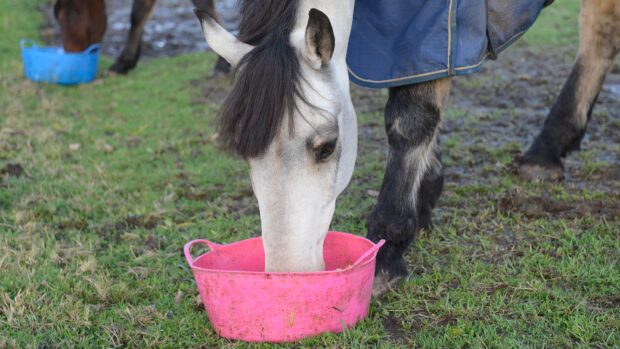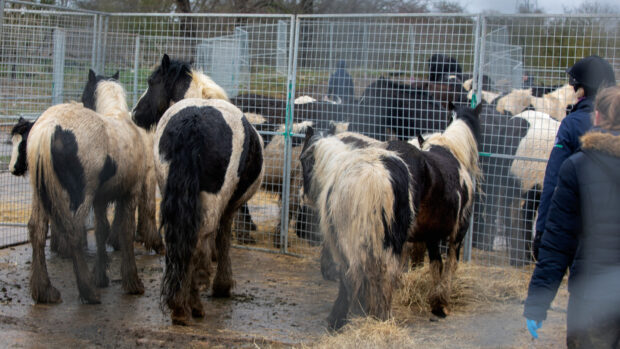A petition calling for major changes to the management of the Spanish Riding School Vienna has received almost 12,000 signatures – as concerns are raised about the school’s future.
The petition, started by classical trainer Alfons J Dietz, who was based at the Spanish Riding School as a rider for eight years, follows the departure of chief rider Andreas Hausberger, who was reportedly dismissed last month after 40 years with the school. This departure comes three months after Alfred Hudler was appointed the school’s managing director.
The petition calls to “stop the destruction of the school” and states “if we don’t act now, we will lose this cultural heritage item for ever”. The petition asks for an “expert leader deeply rooted in classical horsemanship” to be appointed, for the Spanish Riding School to come under the Austrian ministry of culture – instead of the ministry of agriculture as is currently the case – and for the return of retired chief riders.
Mr Dietz told H&H the Spanish Riding School is the “temple of classical dressage” and said it “pains him” to see the future of the school under threat. Mr Dietz is concerned about the management of the school; believing it should be managed differently.
“I see the mission of the school in danger. According to the law of the riding school and the directives, it is the responsibility of the Spanish Riding School to preserve the classical art of riding,” he said.
“The aim of the petition is to give the riders the opportunity to implement what has been mentioned.”
In 2015 the Spanish Riding School joined the UNESCO representative list of intangible cultural heritage of humanity, which recognises “knowledge and practices concerning nature and the universe or knowledge and skills to produce traditional crafts”, for the school’s classical art of riding.
The school and its stud farm received a second listing in 2022 – for the knowledge concerning the breeding of Lipizzaners – making it the only institution worldwide to be represented on the list twice with two separate cultural elements.
Mr Dietz said the reason the school would be better coming under the ministry of arts and culture is “obvious”.
“It is about horsemanship, an expression of human culture. It was not for nothing that the Spanish Riding School was included in the UNESCO list. The riding school cannot be run like a normal farm with a focus on profit,” he said, adding that he believes the school should be managed similarly to a museum or the Vienna State Opera House for example, which receives funding from the Austrian government.
“In my opinion, the riding school is much more in line with the ministry of arts and culture than the ministry of agriculture.”
Mr Dietz added that he believes there are still riders at the Spanish Riding School who are “committed to the classical way”.
“I am aware that it is difficult to stand against the people who make things difficult. Nevertheless, I urge these riders to stand by their classical path,” he said.
“We can only reach the goal through the riders at the riding school, from the outside we can only support them. Everyone has to show backbone to reach the goal and maintain the Spanish Riding School.”
A spokesman for the Spanish Riding School told H&H the school cannot comment on Mr Hausberger, but with regard to the petition, he said the school is “always open to constructive and soundly based criticism from experts and employees of the Spanish Riding School”.
“Our riders have taken note of the current discussion, their focus however remains the same: passion and love for the horse, the maintenance and cultivation of classical horsemanship and passing down knowledge to the younger, upcoming generation,” he said.
The spokesman added that the knowledge surrounding classical horsemanship and the school are “paramount in all decision-making processes”.
“The Spanish Riding School assures the continuation and maintenance of its world heritage. There are highly qualified and experienced chief riders that remain and ensure the transfer of knowledge and the quality of performances,” he said.
“Through its uncompromising commitment to classical horsemanship the SRS provides the best possible education for its horses and riders. The horses’ education is being assessed by external experts at least once a year.”
On the petition’s calls for the Spanish Riding School to fall under the ministry of arts and culture instead of the ministry of agriculture, a spokesman for the ministry of agriculture told H&H that it was “unclear” of the petition’s aim.
“The ministry of agriculture, forestry, regions and water management holds a lot of expertise in the area of agriculture but also with regards to horses,” said the spokesman.
“We would like to remind that the Piber Lipizzaner Stud is an integral part of the Spanish Riding School and the breeding and agricultural components thereof play an essential role.”
A spokesman for the ministry for arts and culture told H&H that “as far as the ministry is concerned there are no plans to move the Spanish Riding School” from the ministry of agriculture.
This is not the first time concerns have been raised about the Spanish Riding School. In 2021 the Austrian Court of Audit (ACA) carried out an audit to assess the school’s economic value, its impact on tourism, the governance, and the legal provisions on animal protection. The audit period was from 2014 to 2019 – and the auditors also took into account “developments” in 2020 such as the implications of the coronavirus pandemic. ACA published its report in October 2021, in which it criticised how the stallions were kept. It stated that from the available records, auditors “could not verify” whether the horses, who are kept in stables in the centre of Vienna, were given the opportunity to move at least once a day either in training or on a horse walker.
“The auditors furthermore note that due to economic pressure the stallions were put into service at a frequency that was detrimental to the horses’ health. Moreover, stallions were used for performances whose physical constitution did not allow for such use. The ACA therefore recommends to improve the husbandry conditions for the stallions in Vienna,” read a summary of the report.
The ACA also said that the Spanish Riding School had faced “financial problems” since 2001, “hence long before the pandemic” – and the report notes the school’s economic existence was “even at risk in 2014”.
Since 2009 the ministry of agriculture has granted the school an annual breeding subsidy, but ACA said this cannot provide medium-term planning security as the money relates to one year only. The ACA recommended that the ministry of agriculture substitute the annual allowance to form a multi-annual basic compensation, similar to that already in place for other cultural institutes such as museums and state theatres.
H&H asked the Spanish Riding School if it had carried out any of the ACA recommendations. The spokesman told H&H that the Republic of Austria, which owns the school, had chosen Alfred Hudler as its new managing director.
“His entrepreneurial vision and leadership experience were deciding factors in order to guide the Spanish Riding School into a promising future,” said the spokesman, adding that the ACA report covers up until 2019, and 2020 which was heavily influenced by the pandemic, and this was before Mr Hudler was in position.
“With his excellent team he aims to deliver the utmost quality while always maintaining the horses’ wellbeing as the highest priority.”
The spokesman said that the school employs an in-house vet, as well as “outside experts who take the best care of the well-being” of the school’s stallions.
“Of course only stallions that meet the strict health criteria present their skills in our performances,” he said, adding that the number of performances have been reduced over the years. There are 90 performances planned for 2023.
You might also be interested in:

‘Tiny, fearless and determined’: final farewell to medal-winning event rider

Anna Ross: ‘Talent alone is not enough to stay at the top in dressage’

Subscribe to Horse & Hound magazine today – and enjoy unlimited website access all year round
Horse & Hound magazine, out every Thursday, is packed with all the latest news and reports, as well as interviews, specials, nostalgia, vet and training advice. Find how you can enjoy the magazine delivered to your door every week, plus options to upgrade your subscription to access our online service that brings you breaking news and reports as well as other benefits.




